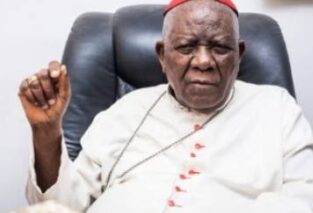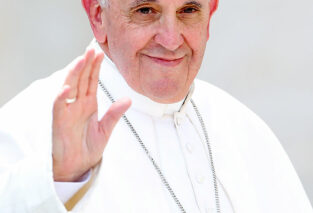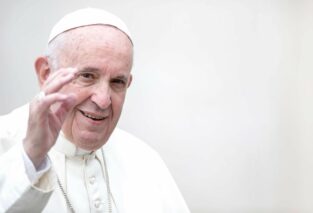This is the last of the three articles I wrote on the Holy Father’s visit to Cameroon in 1995.
The culminating point of the Holy Father’s visit to Cameroon was definitely the promulgation session of the Post-Synodal Apostolic Exhortation, Ecclesia in Africa, at the Our Lady of Victories Cathedral in downtown Yaoundé on Friday, 15 September 1995.
The Head of State, Mr. Paul Biya and his family arrived at 4:25 p.m. Exactly five minutes later, the Supreme Pontiff, Pope John Paul II, made his way into the packed-full cathedral to a truly euphoric reception. Banners were unfurled in the crowd and one of them announced in bold letters the love the pygmies of Mouloundou have for the Holy Father. Dispersed in the crowd were individuals waving the red and white flag of Poland, reminding the Holy Father that the people of his homeland are also among those who are spreading the Good News of our Lord’s salvation in our country.
Security men had quite a hard time fraying a passage for the Pope to the altar. This was all the more challenging as the Holy Father would not walk past any child that was presented to him. In fact, one woman literally threw her child into the Holy Father’s arms from behind a group of people blocking her way. As usual, the Pope paused long enough to embrace and bless the child, a gesture that sent his mother dancing with joy.
After the recitation of the prayer of the Synod, Christian Cardinal Tumi, Cameroon’s only Cardinal, then took the floor and, among other things, stressed that it was vital for African cultures to receive the Gospel message and be purified by it. That is what inculturation is all about. Then came the turn of Monsignor Basile Mve Engone, Bishop of the Diocese of Oyem in Gabon, Chairman of the Episcopal Conferences of the Central African Region (ACERAC). Among other things, he regretted the negative image Africa and her people have suffered from over the centuries, particularly in the Western media, but concluded that the “Synod of Resurrection and of Hope” had come to deliver Africa and her people from their fears and tribulations.
The Archbishop of Abuja (Nigeria), His Grace John Onaiyekan, summarized the document of the Post-Synodal Exhortation, Ecclesia in Africa, and outlined what he saw as the challenges ahead, especially in the areas of inculturation, dialogue, peace and social justice, the proclamation of the Good News and the use of the means of social communication to spread the Gospel.
Non Catholics welcome the synod
Then came the turn of non-Catholics. Pastor McClean Kumi, a minister of the Methodist Church of Ghana, spoke for the Protestant churches of Africa. He saw the Catholic Church’s invitation to non-Catholic congregations to such important events as the Vatican II Council and now the present Synod as a salutary quest for Christian unity. He said other Christian denominations in Africa would no doubt also benefit from the fruits of this Synod.
The representatives of the Muslim community in Cameroon, Sheikh Mounir Pekassa Sin Ibrahim, saw the association of Muslims with the Holy Father’s visit as a welcome sign of fruitful and peaceful cooperation between the monotheistic religions of Africa. He highlighted for praise the Holy Father’s role in facilitating the construction of a mosque at the Vatican. He then loudly condemned religious fanaticism and sects, and hoped that the Holy Father would ensure that the inter-religious forum held in Cameroon each year would continue.
Voice of the ‘voiceless’
When it had earlier been announced that a representative of traditional religions would also intervene, many must have been expecting to see a traditional ‘priest’ or ‘jujuman’, bare-chested and grass-skirted, with zebra-like chalk-marks on his chest, waving a horse-tail fly-whisk in the air, chasing invisible flies and conferring with invisible spirits. That was not to be, however, because a university don, Professor Pierre Titi Nwell, a convinced Catholic intellectual himself, stood in a three-piece suit to speak for what he called the ‘voiceless’ adepts of traditional religion, which he lauded for its hospitable and accommodating nature. He said that since the ancestral cult is such an integral part of African life, Christians themselves tend to believe in it. As such, the Church must strive to understand and cooperate with traditional religious, beliefs which infiltrate every aspect of an African’s life.
Accept Christ in your cultures
Concluding the evening, the Holy Father, who had all along been silently telling the beads of his rosary, no doubt praying for the success of the event, took the floor and stressed the importance of religious tolerance. Defining inculturation as the intimate encounter of people’s cultures with Christ, he appealed to African theologians to help their people to understand and appreciate the Gospel message more fully. He then urged the African man and woman to stand up erect and walk tall and proud into the third millennium of the Christian era.
A scene similar to the delirious moment that had greeted the Holy Father’s entry into the Cathedral, repeated itself as people rushed to touch him before he left, giving the security men and women quite a run for their money.
Reproduced from L’Effort camerounais No 31 (1028) of 23 September – 6 October 1995, p. 17).
Douala, May 02, 2014


